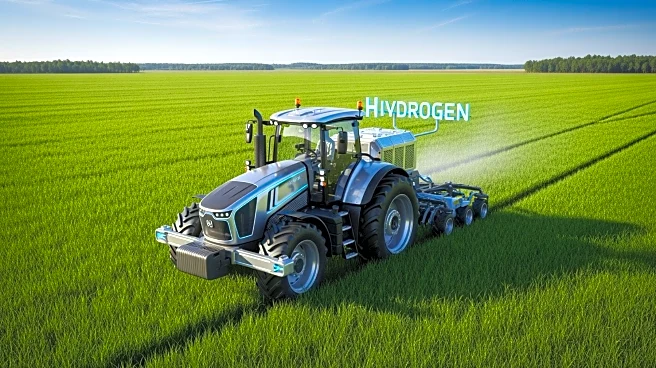What's Happening?
Kubota has introduced a groundbreaking hydrogen-powered, self-driving tractor at the World Expo 2025 in Osaka, Japan. This innovative machine is designed to tackle labor shortages and promote sustainable farming practices. The tractor is equipped with
a 100-horsepower hydrogen fuel cell stack, enabling 12 hours of uninterrupted operation per refueling, and it operates with zero CO2 emissions. Its autonomous driving capability allows it to function without a driver, using AI-powered cameras to detect obstacles and stop automatically. This development follows the evolution from a 60-horsepower manned version introduced in 2024, which could perform farm tasks for four hours on a 10-minute refuel.
Why It's Important?
The introduction of Kubota's hydrogen-powered, self-driving tractor represents a significant advancement in agricultural technology. It addresses critical issues such as an aging workforce and reliance on fossil fuels, which contribute to environmental pollution. By offering a zero-emission solution, the tractor not only supports sustainable farming but also enhances productivity and efficiency in the agricultural sector. This innovation is poised to reduce operational costs and improve the quality of life for farmers, while contributing to cleaner air and reduced environmental impact. The combination of autonomy and hydrogen power positions Kubota as a leader in eco-friendly agricultural solutions.
What's Next?
Kubota is currently developing the practical application of this tractor, with plans to make it available for widespread use. As the technology matures, it is expected to transform farm fields into efficient, eco-friendly, and tech-driven environments. The tractor's success could lead to increased adoption of hydrogen-powered machinery in agriculture, further reducing the sector's carbon footprint. Stakeholders in the agricultural industry, including farmers and environmental groups, are likely to monitor the tractor's performance and impact closely, potentially influencing future investments in sustainable farming technologies.
Beyond the Headlines
The development of Kubota's hydrogen-powered tractor highlights the growing importance of integrating technology and sustainability in agriculture. It raises ethical considerations regarding the displacement of human labor by autonomous machines, while also offering a solution to labor shortages. The tractor's zero-emission operation aligns with global efforts to combat climate change, showcasing the potential for hydrogen fuel cells to revolutionize various industries beyond agriculture. As the technology advances, it may prompt discussions on regulatory frameworks and incentives to support the adoption of clean energy solutions in farming.
















